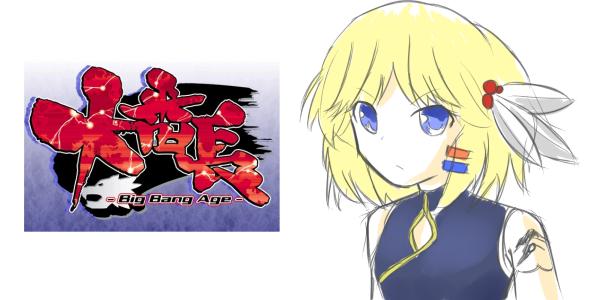
VN Talk is a series of posts that talks about a VN and my personal experiences with it. Consider it a sort of mini-review.
Daibanchou: Big Bang Age, often shortened to just “Daibanchou” or “BBA” is a visual novel by alicesoft that you’ll rarely find anyone talk about these days. This is mostly because it’s an old game, being released back in 2003, and the fact that it occupies a pretty niche genre. It might be worth your attention though — if you don’t already know about it — so today I’ll talk about why you might (or might not) want to play this VN slash S-RPG.
The story of Daibanchou begins in the generic year 200X, when a mysterious hole appeared and teared the whole country of Japan out of shape. This hole gave rise to monsters and caused strange rocks called “B-crystals” to spawn, giving special powers to some people (mostly students) and plunging the whole country into war. The VN itself starts at an unspecified amount of time after these events, where we take control of a gifted “special student” named Zanma Rouga. He is an ambitious man who plans to get to the bottom of the whole problem, uniting Japan in the process.
The story itself is actually nothing special. It’s a generic supernatural “save the world” (in this case, Japan) kind of plot. “Then what’s the point of a VN with a bland story?” I hear you ask. Well, this VN is much more than that.
To start off, this VN, while being a normal novel, is also an S-RPG at heart. Uniting the country isn’t an easy process, and unlike most VNs, the game won’t do it for you. We have to micro-manage the whole thing — choosing which territory to take and when to do so, building improvements on your own territories, spending action points, fighting out battle scenes, etc. You start out in one school and eventually expand to the whole country.
The real beauty of this VN really shows after you’ve taken your first few territories. The story reacts dynamically to the order and speed of your conquest, as well as having many territory-specific decisions. This means you have pretty much a crapload of branches to choose from, and that the story won’t be linear (at least to a degree). You want a specific guy on your party? Well you better hurry up and get to him, else he’ll get killed.
This brings me to another point of this VN I really liked: the party system. It brings a lot of RPG-esque elements into the VN, such as levels, skill sets, and attack power, and also adds to the story by having specific events linked to specific characters. I’ve played through this VN about 7-8 times now (I totally did not dedicate at least 4 of them to Sion *cough*) but I still keep finding new pieces of story just around the corner. Most of the characters are also well designed and written, which really makes you want to get to know them more.
Speaking of characters, let me bring up one of the VN’s most important points: the heroines. There are 6 heroines in total, and they range from waifu-worthy to bleh. This point is pretty much up to your preference and biases, so I won’t talk much about it. What I will talk about though is something closely related to this, and it is the “ero” in “eroge”. Depending on your preferences this might be a big win or a deal-breaker, but this VN is a massive offender. Unlike VNs such as Fate/Stay Night which only have H-scenes due to it being the norm at the time, Daibanchou is designed from the ground up to be an eroge. This means that the protagonist is a massive womanizer, the character designs are suggestive, the screenwriting has tons of sexual references (which most of the characters seem to be okay with), and there are many explicit scenes even outside the designated H-scenes. The H-scenes themselves aren’t your normal affair either, as they have unskippable choices and are much longer than average.
In conclusion, If the ero sounds like a deal breaker to you then my advice is that you shouldn’t play this. If you can tolerate these kind of stuff however, you should definitely give it a try. If you enjoy them.. well, I think you know what to do.


